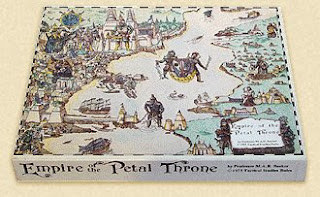The latest serious discussion on this subject involves M.A.R. "Phil" Barker and Empire of the Petal Throne. It turns out the creator of this classic RPG setting was a full-on, deeply engaged Nazi. Wrote under a pen-name a Third-Reich wish-fulfillment novel that was published by a notorious white supremist publisher. And he sat on the board for a holocaust-denier group. Yeah, definitely a bad person.
And yet there is a good work. The original Empire of the Petal Throne campaign setting was a marvel of its age. Published by TSR in 1975, at a time when D&D was still emerging from its "little brown books", it was an amazing product: the first full campaign setting in a box, with detailed maps, tons of lore, and a high price tag. In a genre already dominated by Western Medieval tropes, it carved a non-western, exotic, unique setting. I have been a fan, and EPT's very publication has had deep repercussions within the gaming hobby about how to do this sort of thing. Since its release, there have been numerous attempts to simulate the world with a number of game systems, but the core world remains as Barker laid it down.
A horrible person created something worthwhile. And his work will forever be tainted by the failures of its creator. I want to separate art and artist, but that just doesn't fly in a world where we bind the two together, for the purposes of analysis, enlightenment, and more mundane marketing. How we live affects how we write. The creator infuses the creation. So, what to do?
Nine years ago in this space, in the midst of another tempest involving another author, I wrote about Lovecraft, who was definitely problematic. Ultimately, I came to the conclusion that while we cannot fully separate creation from creator, we can TAKE the creation away from the creator. We recognize Lovecraft's racism, and will not excuse or bury it. But moving forward, we take the good parts and evolve them fully, and leave the worst behind. In RPGs, in the modern interactive tradition, that can be done more easily than in other media. RPGs are ultimately a group activity, and the bad actors can be overwhelmed by the common good.
I wrote that in 2013. How has it worked out in Lovecraft's case? Well. in 2017 the award winning RPG product Harlem Unbound showed up, which deals with marginalized populations in Lovecraft's universe. Originally from Darker Hue studios, the book has been expanded upon and republished with Chaosium, publisher of Call of Cthulhu putting an official mark on it. The novel Lovecraft Country deals with this in fiction, and has not only been a best-seller but turned into a TV series in 2020. And Alan Moore produced a decidedly creepy comic called Providence dealing with sexual issues within the straight-laced original stories. None of this would have met the approval of the original dead racist.
So yeah, take the ball and run with it. Jeff Dee, who wrote an excellent set of recent rules set in Tekumel, Bethorm, has posted the suggestion to OCCUPY TEKUMEL Challenge or remove the violent, authoritarian, and unchanging nature of the empires. Give it a cleansing scrub. I think this would work. I get the feeling that, much like our own histories, the illusion of a continuous civilization is misleading, as looking at it hard reveals civil wars, uprisings, revolutions both quiet and violent. Yan Kor not only wins its war but inspires other breakaway chunks of Tsolyanu to find their own paths. Let the PCs lead a revolution for a city state within one of the Empires, and forge their own destinies.
The interesting thing is, Tekumel has a couple things already hard-wired into it that encourages this approach. There is the custom of ditlana, a renewal process where cities are literally razed, buried, and new structures place atop them. In game terms, this process creates a a huge number of underground areas with ancient treasures and lost tombs, which facilitates the entire "Go Down In the Dungeon" aspect of play. I have noted in an essay in the Kobold Worldbuilding Guide ("Apocalypso: Gaming After the Fall") that traditional fantasy by its nature is a post-apocalyptic world, in that there were previously great fallen empires that overshadow the "modern day" as well as provide a location to create new adventures in.
In addition, Barker himself spoke of alternate universes, and the desire to let players make the campaign their own. Part of this always sounded like not having to be the "authoritative" source for all things Petal Throne, but also to recognize that others will want to further develop. So be it. The Tree of Time has many branches, and it does us little good to adhere too closely to the main trunk..
The World of Tekumel may need a ditlana and a rebirth after all this. Not to forget the foundations, nor to excuse its original creator, but rather to distribute the depth and potential of the world among others, and let them continue to create and, more importantly, to grow.
More later,



